Intro
Discover the 5 common causes of lymph node swelling, including infections, inflammation, and cancer, and learn about symptoms, treatments, and remedies for swollen lymph nodes, lymphedema, and immune system disorders.
Lymph nodes are small, bean-shaped structures that are part of the body's lymphatic system, which helps to fight infection and disease. They are located throughout the body, including in the neck, armpits, and groin. Swollen lymph nodes, also known as lymphadenopathy, can be a sign of an underlying infection or disease. In this article, we will explore the 5 common causes of lymph node swelling, as well as the symptoms, diagnosis, and treatment options.
The lymphatic system plays a crucial role in our overall health, and swollen lymph nodes can be a sign that something is amiss. When lymph nodes become swollen, it can be a cause for concern, and it is essential to seek medical attention to determine the underlying cause. Swollen lymph nodes can be painful and tender to the touch, and they can also be a sign of a more serious underlying condition.
Lymph node swelling can be caused by a variety of factors, including infections, autoimmune disorders, and cancer. In some cases, swollen lymph nodes can be a sign of a minor infection, such as a cold or flu, while in other cases, they can be a sign of a more serious underlying condition, such as lymphoma or leukemia. It is essential to seek medical attention if you experience swollen lymph nodes, as prompt diagnosis and treatment can help to prevent complications and improve outcomes.
Introduction to Lymph Node Swelling
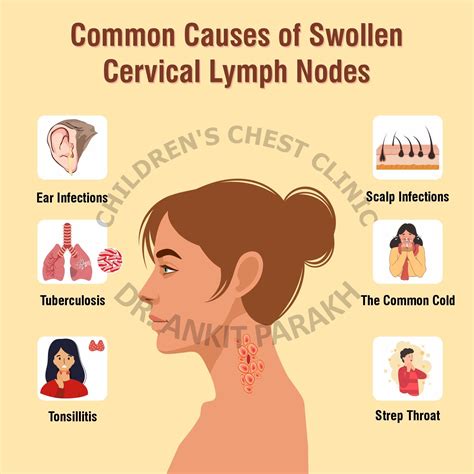
Lymph node swelling is a common condition that can be caused by a variety of factors. The symptoms of lymph node swelling can vary depending on the underlying cause, but they often include pain, tenderness, and swelling in the affected area. In some cases, lymph node swelling can be accompanied by other symptoms, such as fever, fatigue, and weight loss.
Causes of Lymph Node Swelling
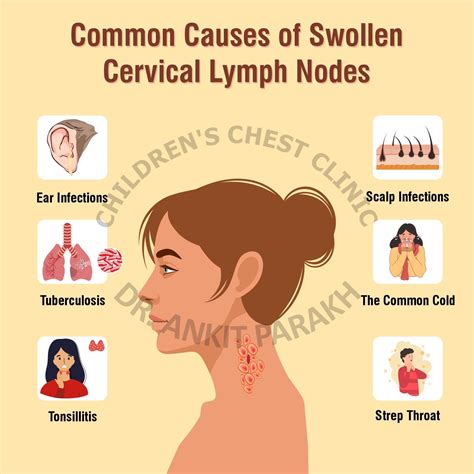
There are several causes of lymph node swelling, including:
- Infections, such as bacterial, viral, or fungal infections
- Autoimmune disorders, such as rheumatoid arthritis or lupus
- Cancer, such as lymphoma or leukemia
- Inflammatory conditions, such as sarcoidosis or tuberculosis
- Allergic reactions, such as an allergic reaction to a medication or insect bite
Infections
Infections are a common cause of lymph node swelling. Bacterial, viral, and fungal infections can all cause lymph nodes to become swollen, and the symptoms can vary depending on the type of infection. For example, a bacterial infection such as strep throat can cause swollen lymph nodes in the neck, while a viral infection such as mononucleosis can cause swollen lymph nodes throughout the body.Autoimmune Disorders
Autoimmune disorders, such as rheumatoid arthritis or lupus, can also cause lymph node swelling. In these conditions, the immune system mistakenly attacks healthy tissues, leading to inflammation and swelling in the affected areas.Cancer
Cancer is another potential cause of lymph node swelling. Lymphoma and leukemia are two types of cancer that can cause lymph nodes to become swollen, and the symptoms can vary depending on the type and stage of the cancer.Symptoms of Lymph Node Swelling
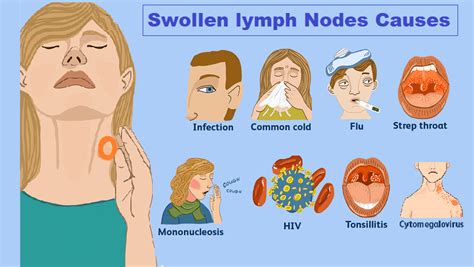
The symptoms of lymph node swelling can vary depending on the underlying cause, but they often include:
- Pain or tenderness in the affected area
- Swelling or enlargement of the lymph nodes
- Redness or inflammation in the affected area
- Fever or chills
- Fatigue or weakness
- Weight loss or loss of appetite
Diagnosis of Lymph Node Swelling
Diagnosing the underlying cause of lymph node swelling can be challenging, and it often requires a combination of physical examination, laboratory tests, and imaging studies. A healthcare provider may perform a physical examination to check for swollen lymph nodes, and they may also order laboratory tests, such as blood tests or biopsy, to help determine the underlying cause.Treatment Options for Lymph Node Swelling
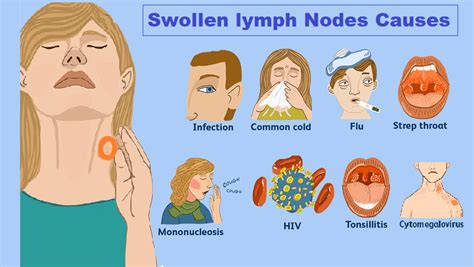
The treatment options for lymph node swelling depend on the underlying cause, but they often include:
- Antibiotics or antiviral medications to treat underlying infections
- Anti-inflammatory medications to reduce swelling and pain
- Chemotherapy or radiation therapy to treat cancer
- Immunosuppressive medications to treat autoimmune disorders
- Surgery to remove swollen lymph nodes or underlying tumors
Prevention of Lymph Node Swelling
Preventing lymph node swelling can be challenging, but there are several steps that can be taken to reduce the risk. These include: * Practicing good hygiene, such as washing hands regularly * Avoiding close contact with people who are sick * Getting vaccinated against common infections, such as flu or HPV * Avoiding exposure to toxins or chemicals * Maintaining a healthy lifestyle, including a balanced diet and regular exerciseComplications of Lymph Node Swelling
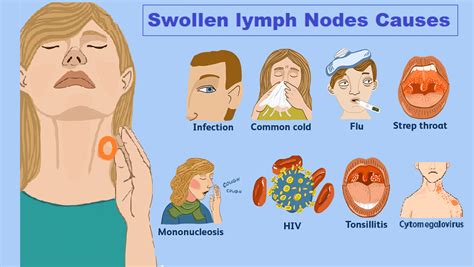
If left untreated, lymph node swelling can lead to several complications, including:
- Abscess formation, which can lead to infection and scarring
- Cellulitis, which is a bacterial infection of the skin and underlying tissues
- Lymphoma or leukemia, which are types of cancer that can develop in the lymph nodes
- Sepsis, which is a life-threatening condition that occurs when the infection spreads to the bloodstream
Conclusion and Next Steps
Lymph node swelling can be a sign of an underlying infection or disease, and it is essential to seek medical attention if you experience swollen lymph nodes. By understanding the causes, symptoms, and treatment options for lymph node swelling, you can take steps to reduce your risk and improve your overall health. If you have any concerns about lymph node swelling, be sure to speak with a healthcare provider, who can provide personalized advice and treatment.What are the common causes of lymph node swelling?
+Lymph node swelling can be caused by a variety of factors, including infections, autoimmune disorders, cancer, inflammatory conditions, and allergic reactions.
How is lymph node swelling diagnosed?
+Diagnosing the underlying cause of lymph node swelling can be challenging, and it often requires a combination of physical examination, laboratory tests, and imaging studies.
What are the treatment options for lymph node swelling?
+The treatment options for lymph node swelling depend on the underlying cause, but they often include antibiotics or antiviral medications, anti-inflammatory medications, chemotherapy or radiation therapy, immunosuppressive medications, and surgery.
Can lymph node swelling be prevented?
+Preventing lymph node swelling can be challenging, but there are several steps that can be taken to reduce the risk, including practicing good hygiene, avoiding close contact with people who are sick, getting vaccinated against common infections, avoiding exposure to toxins or chemicals, and maintaining a healthy lifestyle.
What are the complications of untreated lymph node swelling?
+If left untreated, lymph node swelling can lead to several complications, including abscess formation, cellulitis, lymphoma or leukemia, and sepsis.
We hope this article has provided you with a comprehensive understanding of lymph node swelling, its causes, symptoms, diagnosis, treatment options, and prevention strategies. If you have any further questions or concerns, please do not hesitate to reach out to a healthcare provider. Additionally, we invite you to share this article with others who may be interested in learning more about lymph node swelling, and to leave a comment below with any thoughts or questions you may have.
